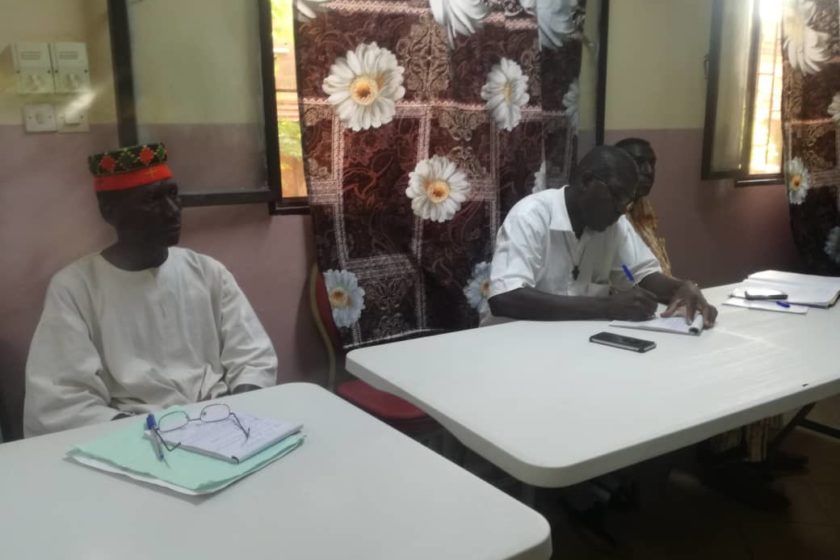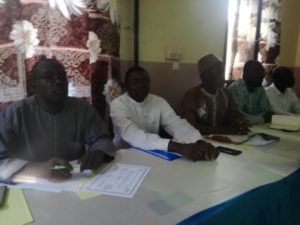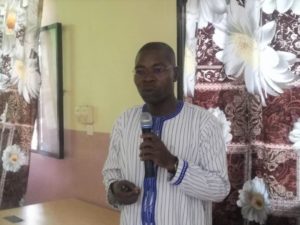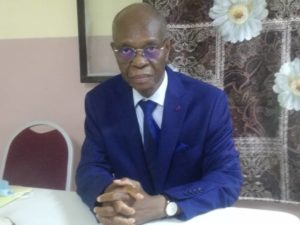At the Center for Studies and Reflection for College, High School and Student (CERCLE), in the Gounghin district of the city of Ouagadougou, a restitution workshop was held on Thursday, October 22, 2020 on the central theme: « religious leadership in Burkina Faso: contribution of religious leaders to lasting peace ”. This workshop was followed by discussions during which several panelists took part. Pr Father François Kaboré, Jesuit priest, director of CERCLE and promoter of Kosyam University, was the main restitutor.
Commissioned by the Africa World Institute (IAM), the study which was conducted and reported in Burkina Faso by Prof. Father François Kaboré, director of CERCLE and promoter of Kosyam University, is directly in line with the program of reflection and actions of the IAM on the issues of sustainable peace building in Africa initiated in 2018, with the aim of highlighting the value of interreligious meetings and dialogues as vectors of a spirit and a culture of peace, mutual understanding and tolerance.
According to Pr Père François Kaboré, the study consisted of carrying out field research, which took place from the end of July to the end of September 2020, in the regions of Center, Plateau-Central, Center-Ouest, Center-Nord, Center-Est and Hauts-Bassins, particularly in the cities of Ouagadougou, Zorgho, Koudougou, Kaya, Pouytenga and Bobo-Dioulasso. Three hypotheses were then tested, and relate respectively to “an acceptance of religious plurality favoring the recognition of the sovereign role of the State as guarantor of this plurality; the recognition of the sovereign role of the State in the public space favors the acceptance of the other; and acceptance of the other promotes peace ”.
At the end of the study, the promoter of Kosyam University said that only the last hypothesis, namely « acceptance of the other promotes peace », has been validated. However, he points out that the two working hypotheses are not validated implies that with regard to the religious fact, the social peace experienced by the Burkinabè does not derive from the role of the State as guarantor of religious freedom, d ‘where its potentially precarious character. From this point of view, the respondents’ responses suggest that traditional culture or religion plays a preponderant role in social peace in Burkina Faso, even though this peace would be precarious, because it is not based on the tools of modern governance, in particular the sovereign role of the State, as an organizer of social peace.
The recommendations formulated within the framework of this study invite the State to strengthen its sovereign role for social peace and to help the emergence of moderate voices in religious communities. Likewise, non-public authorities could play their role in providing training for their leaders. And finally, the leaders themselves are invited to better train themselves, to experience religious plurality and to become aware of the conflict-generating nature of any religion. In view of the results obtained at the end of the study, it was not excluded that future studies be held which would dwell on the role of tradition in building peace.
Prof. Pascal Houénou, study coordinator for Burkina Faso and Mali, director of the IAM in Abidjan, expressed his satisfaction with the study and the discussions that followed. “This is a study that was conducted on a solid scientific basis, since the analyzes have been made, the interpretations have been made in a scientific way; a panel of experts makes it possible to further document the results that were set out in the provisional report already available, ”he said.
About thirty religious leaders from several regions of Burkina Faso were present at the workshop. A panel, moderated by Abbot Alfred Bonkoungou, saw the intervention of teachers and professors of the traditional, Muslim and Christian religion. Among the participants, we could also note the presence of priests, pastors, imams, traditional leaders.
As a reminder, the Africa World Institute (IAM) is a think tank, based in Paris, France. It was created in 2013 in Paris. It is an independent and apolitical non-governmental organization (NGO), which aims to contribute, through reflection, exchange, studies and debate, to the recognition of Africa’s potential so that it just takes its place. in the world.
Tambi Serge Pacôme Zongo
Latribunedufaso.net





